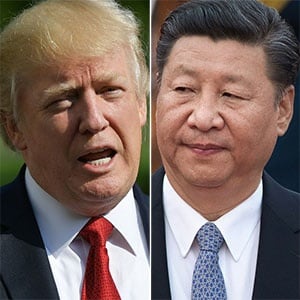Fears of a worsening trade war between economic superpowers the United States of America and China over tariffs may have only a negligible impact on SA, according to Efficient Group economist Francois Stofberg.
Stofberg's observation is in line with the International Monetary Fund's assessment of the situation between the world's two largest economies. The IMF warned in June that the US/China tariffs were expected to cut global economic output by 0.5% in 2020.
But it also calculated that more than a third of the existing ones - equivalent to around 1.2% of world GDP - qualify as "excessive", meaning they are bigger than required for the economy to match its potential in the long run.
On Monday morning the rand weakened against the dollar, opening trade at R14.74 to the greenback. It was later nudging R15/$, changing hands at R14.98/$ by early evening, which analysts attributed to the fall-out from tensions between the US and China.
The US referred to China as a "currency manipulator" after People's Bank of China Governor, Yi Gang, declared that his nation wouldn’t use the yuan as a tool to deal with trade disputes.
Impact 'overstated'
Stofberg told Fin24 told on Tuesday morning that even the worst-case scenario projections about the impact of the trade war do not take into account measures that individual countries will take to shield themselves from any risks from the trade talk fallout.
"A complete fallout in recent theories, shows that it will spill over to the rest of the world and Europe. The impact of global GDP of a complete fallout [between the US and China] will be 3% at worst is expected. But models don’t take into account the measures individual countries take to avert the fallout, like China devaluing the yuan," said Stofberg.
Stofberg said the impact might not even be that considerable for the countries in the trade talks, compared to the structural slowdown already taking place in China and the resilience of US consumers.
"Models overstate the impact of a fallout on a global level. We are looking at a 1% to 2% deduction in global GDP. The slowdown the Chinese economy is experiencing is more structural than anything to do with the trade discussions," Stofberg said.
Stofberg said even if American exporters lose Chinese consumers for their exported goods, the country could quickly find new consumers to supplement the gap.
Trade benefits
He said while Trump is known to weaponise tariffs against countries that do not yield to his agenda, South Africa should continue enjoying good trade benefits from the US through the African Growth and Opportunity Act.
"As long as free trade agreement stays in place between AGOA countries, we can be stable. However, he appears to be on a path to re-do a lot of those agreements. Higher prices might mean lower exports, but net value will likely remain the same," he said.
Stofberg told Fin24 that the rand was always likely to react to major economic developments because of how connected and exposed the currency is.
Exposed to headwinds
"Unfortunately we are a small and connected economy so we remain exposed to these headwinds. When the world goes mad, we are always likely to feel it. Investors are looking for safety in these times, so they will go to the dollar and gold for security," said Stofberg.
Stofberg said while South Africa has had challenges where it relates to trade, the country has posted strong figures when it comes to trading commodities.
"We haven't seen the structural slowdown in supply chain people are worried about. Global trade is still strong, and you will not likely see a slowdown in exports from South Africa. Our commodity prices are doing quite well including manganese and palladium," said Stofberg.
Key risks
Investec chief economist Annabel Bishop, on the other hand, said the rand would likely weaken substantially, particularly if the US did not engage in significant monetary easing, see severe down case.
"A global recession is also a key risk in a global trade war, with SA likely experiencing a severe recession too," said Bishop.
FXTM senior research analyst, Lukman Otunuga, wrote that gold was positioned to remain one of the safest investor destinations this week as a combination of US-China trade disputes and global growth concerns boost appetite for "safe-haven assets".
"For as long as risk appetite is dented by global growth fears, trade drama and Brexit uncertainty among many other geopolitical risk factors, Gold bulls will remain in the driving seat. In regards to the technical picture, the solid daily close above $1460 may open the doors towards $1485 and $1500, respectively," Otunuga wrote.
NKC African Economics economist Gerrit Van Rooyen told Fin24 that the rand clawed back some losses, in line with other emerging market currencies, as the Chinese central bank helped to pull the Chinese renminbi back to ¥7 per dollar.
"The only way South Africa can reduce its vulnerability to external shocks, such as the US-Sino trade war, is to improve economic growth, and reduce its dependence on foreign capital and goods – none of which are viable with a quick fix," Van Rooyen said.





















